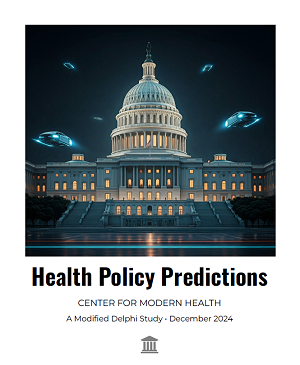Health Policy Predictions
We asked a broad set of experts to rate the likelihood that various policy changes will occur in the next five years.Introduction
In the next five years, which health policy changes are most likely to happen? Will U.S. spending on healthcare keep rising and surpass 20% of GDP? Will we finally change the preferential tax status of employer-sponsored health insurance? Will there be big changes in the prevalence of direct primary care practices, cash-only ambulatory surgical centers, or supervised injection sites? Will an alternative drug approval process emerge to replace the U.S. Food and Drug Administration (FDA)? Having answers to these questions—or even a better-than-chance guesstimate—could help advocates, academics, physicians, patients, and others decide how to allocate their limited time and resources.
As the saying goes, prediction is difficult—especially about the future. There is reason to be skeptical of the ability of any isolated expert to accurately predict the events that will unfold. Writer David Brooks describes how scientists such as Philip Tetlock have come to believe that "experts are generally terrible at making predictions about future events," the reason being that experts tend to hold onto their views too firmly, even in the face of new information to the contrary. "They use their knowledge to support false viewpoints," he explains.
At the same time, however, there is substantial evidence supporting the idea that aggregating a large number of independent guesses can lead to surprisingly accurate predictions. This phenomenon is known as the "wisdom of the crowd." It is believed that it works because individual errors in judgment tend to cancel each other out when the estimates are averaged, provided that each member's guess or prediction is made independently, and there is no systematic bias affecting everyone. For example, experiments have shown that when people independently guess the height of the Eiffel Tower or the number of jellybeans in a jar, the average of their guesses often comes remarkably close to the correct answer. In the context of forecasting, this principle underpins methods like the Delphi technique, where the aggregation of expert opinions can yield forecasts that are more accurate than those of any individual participant.
This report presents the findings of a "modified Delphi" method forecasting exercise designed to assess the likelihood of various U.S. health policy changes over the next five years. This study surveyed a small but broad set of mostly market-friendly experts, including academics, healthcare professionals, think tank scholars, and policymakers, on 28 propositions spanning a wide array of healthcare topics. These topics ranged from the potential for U.S. healthcare spending to exceed 20% of GDP, to shifts in the structure of health insurance, the rise of direct primary care and cash-only surgical centers, and changes in policies related to drug use and healthcare access, such as the legalization of supervised injection sites.
The result is a set of predictions that might help us gain insight into how experts envision the future of health policy in response to current trends, emerging technologies, and shifting political dynamics. As healthcare continues to evolve, we hope this exercise helps inform policymakers, academics, patients, industry leaders, and other interested individuals in navigating the complexities of healthcare reform.

